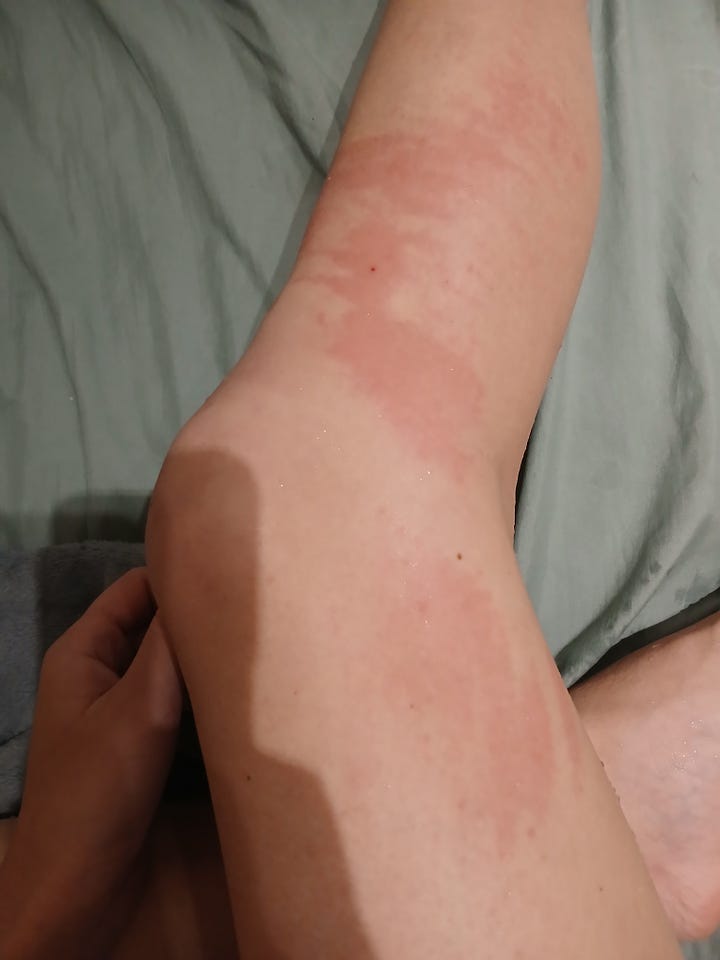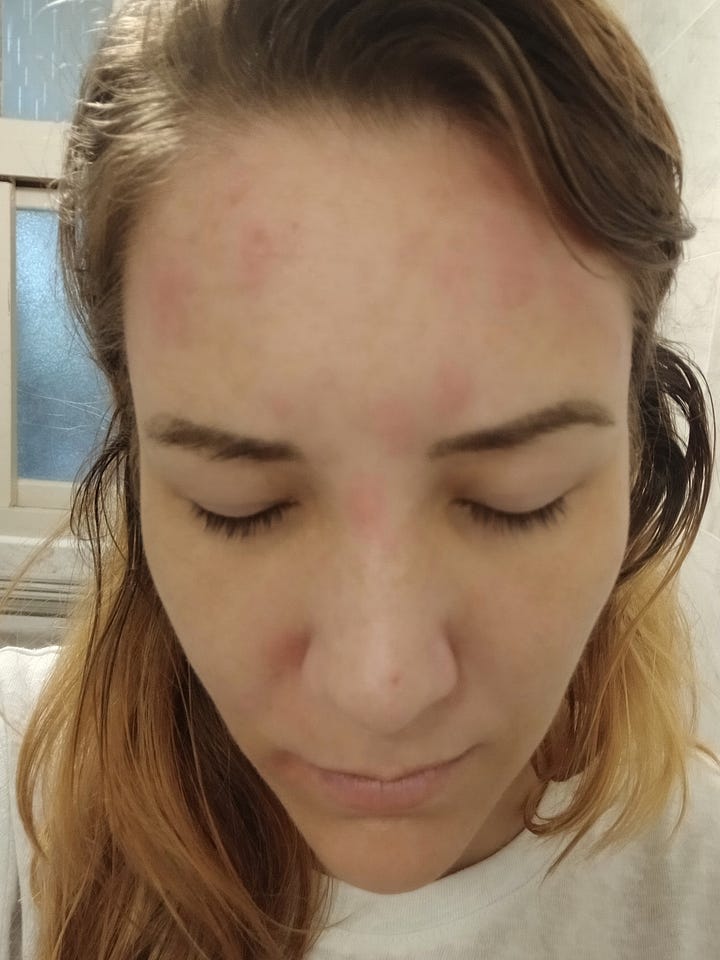
Background
As someone who has been struggling with this for years, I can first share a bit of that personal journey and some key insights.
I first learned I had MCAS when I returned to the US from Thailand. I was exposed to new food, a new environment, and new stressors (and had an especially stressful job at the time). This experience of living in Thailand in my life was truly transformative and I don’t hold any blame to that point of reference. From the bit of research I’ve done it seems to be mostly genetic, but I need to do more research on this.
I had developed issues with rashes and hives after eating, and when I did a skin test back in the US I reacted to nearly everything they skin-tested me for. They said “don’t eat tomatoes, corn, beans…” Literally every food they tested me for. After suggesting MCAS (although hard to officially diagnose), I began to research, and stuck with a strict low-histamine and gluten-free diet. After several months, I was able to eat most of the foods I’d reacted to in the allergy test without any problems.
This stayed stable for a few years, but occasionally I struggled with gum infections that I think were related, and the occasional hives and rashes that I took antihistamines to deal with.
I had another flare-up after about 5 years. My throat was constantly swollen, and the doctor thought it was a throat infection. After 3 rounds of antibiotics, a blood test showed massively spiked levels of Immunoglobulin E (IgE), an antibody that plays a key role in the body's immune response to allergens. I then went to an allergist who had me do allergy shots weekly for a few months, and that helped.
Most recently I’ve been dealing with rashes, swollen throat, fatigue, and recurring sinus infections for almost four months. It’s quite miserable, but I want to keep trending on this blog and on the topic of health and fitness for better wellness, to help alleviate this problem and help others along the way.


Introduction to Chronic Illness
In North America, there is a growing number of individuals suffering from chronic illnesses that often go undiagnosed or misdiagnosed. Traditional medical practices tend to focus on treating isolated symptoms rather than the interconnected nature of chronic conditions. Patients frequently see various specialists who may offer conflicting diagnoses and treatment plans, resulting in frustration and prolonged suffering. Recent research has started to connect these disparate symptoms under common syndromes, particularly chronic inflammatory response syndrome (CIRS) and mast cell activation syndrome (MCAS).
What is Mast Cell Activation Syndrome (MCAS)?
Mast cell activation syndrome (MCAS) encompasses a spectrum of disorders that result from the inappropriate release of mast cell mediators, leading to a range of multisystem symptoms. Unlike other conditions that can be diagnosed through routine lab tests, MCAS often presents without clear abnormalities. Symptoms can fluctuate, creating a complex clinical picture that can be challenging to diagnose. Common indicators may include:
Allergies and skin rashes
Disturbed gastrointestinal function
Unexplained anxiety and headaches
Insomnia and poor wound healing
Dr. Lawrence Afrin, who specializes in MCAS for Armonk Integrative Medicine, posits that MCAS is an epidemic, potentially affecting 14-17% of the population, and often takes years for patients to receive an accurate diagnosis.
The Role of Mast Cells and Their Mediators
Mast cells are essential components of the immune system, located throughout the body, especially in areas exposed to the environment. They release numerous mediators, including histamine, which play vital roles in immune response. However, in conditions like MCAS, mast cells can become dysfunctional, leading to excessive release of these mediators. Symptoms can manifest as:
Skin issues, such as hives and flushing
Cardiovascular problems, including tachycardia and hypotension
Gastrointestinal disturbances, such as bloating and diarrhea
This overactivity can lead to life-threatening reactions, including anaphylaxis.
Diagnosis and Challenges
Diagnosing MCAS is particularly challenging due to its wide-ranging symptoms and the lack of standardized testing. A thorough evaluation by a knowledgeable physician is crucial. Diagnostic approaches may involve:
Detailed patient history and symptom tracking
Laboratory tests for mast cell mediators, such as histamine and tryptase
Ruling out other conditions with similar presentations
Patients may need to undergo multiple tests over time, especially during symptom flare-ups, making early detection difficult.
Treatment Strategies
Management of MCAS focuses on reducing mast cell activation and alleviating symptoms. Effective strategies include:
Dietary modifications: Following a low-histamine diet and avoiding known triggers.
Medications: Antihistamines (H1 and H2 blockers), mast cell stabilizers, and leukotriene inhibitors may be prescribed to control symptoms.
Lifestyle changes: Stress reduction, ensuring quality sleep, and promoting good gut health through probiotics and dietary choices can help stabilize mast cells.
Conclusion
Mast Cell Activation Syndrome represents a complex and often overlooked condition that can significantly impact quality of life. Individuals experiencing chronic, multifaceted symptoms should consider discussing MCAS with their healthcare provider, as recognizing and addressing this condition can lead to improved health and well-being.
My Tips
You don’t have to be diagnosed to try adjusting your diet and see if it works. Sometimes finances or lack of healthcare resources can make it hard to see the right professional.
Histamine blockers can help, as well as vitamin D (and/or sunshine!!) and Vitamin K2. Tumeric Cucumin, Quercetain with Bromelin, Stinging nettle supplements can help.
Anti-histamines help if you have minor symptoms. I personally try to avoid taking them daily, however.
Alcohol and fermented foods like yogurt can be especially triggering. Especially red wine, and I avoid champagne at all costs.
Intermittent fasting can help.
Research low histamine foods and eat more of those, and limit high histamine foods.
Eat whole foods and steer clear of anything processed.
Exercise helps!
Mindfulness and meditation helps as well, as alleviating stress and anxiety helps to keep symptoms at bay.
I found this video to be particularly helpful:



